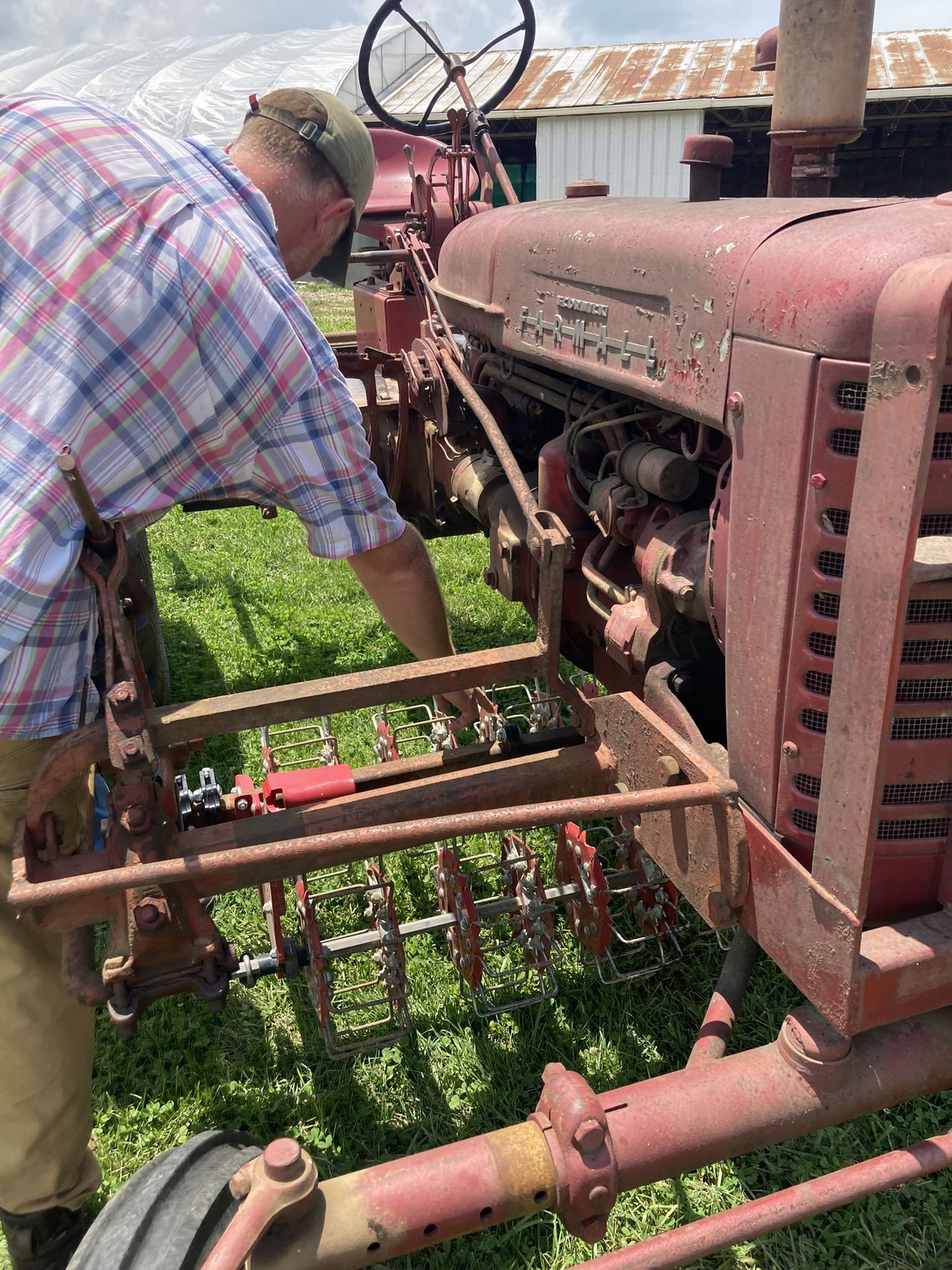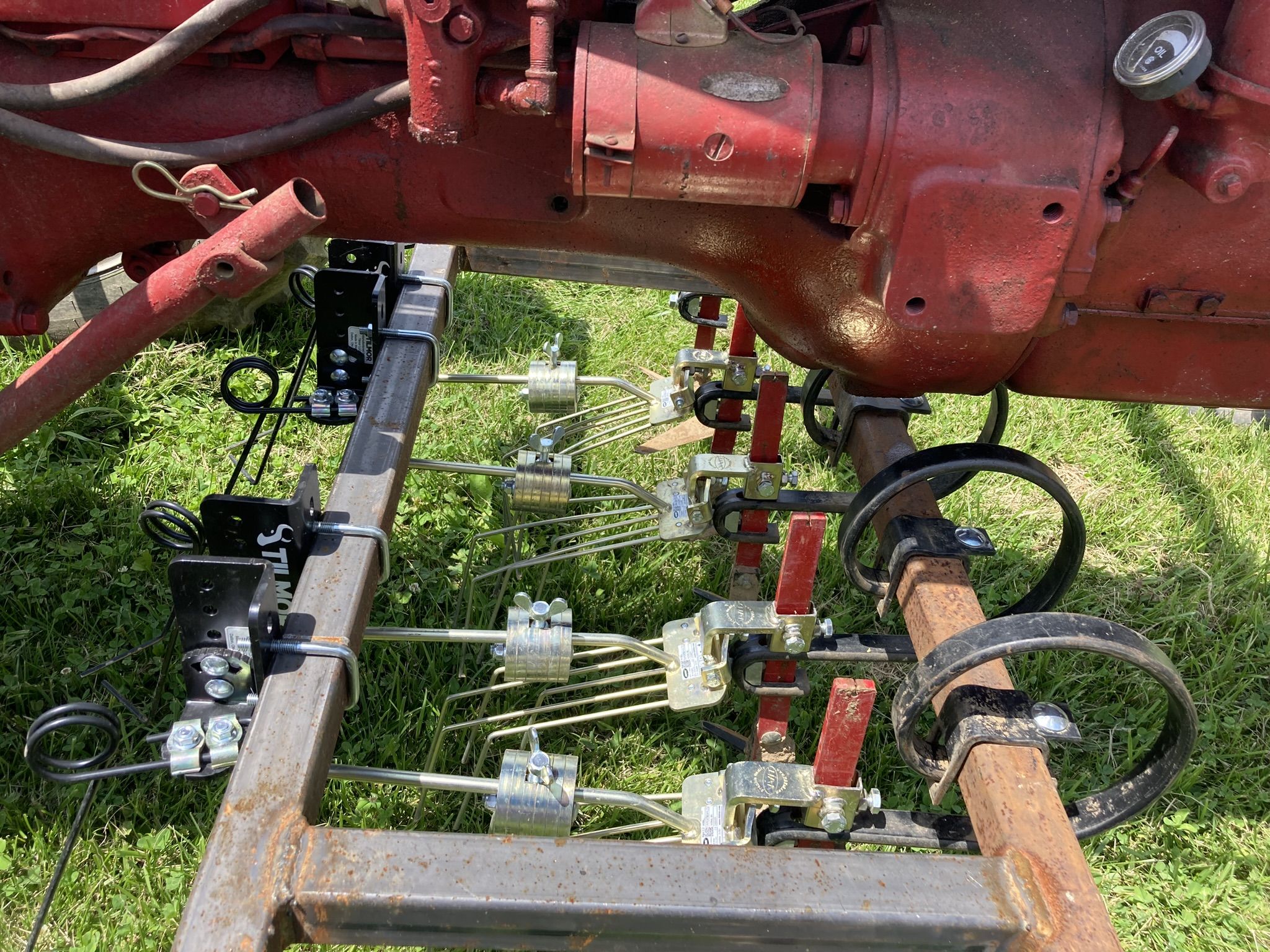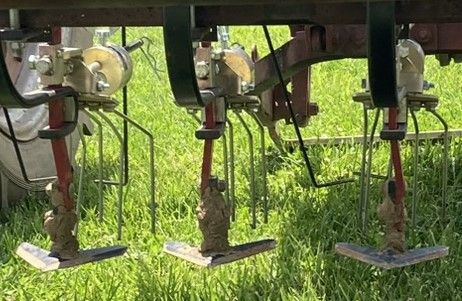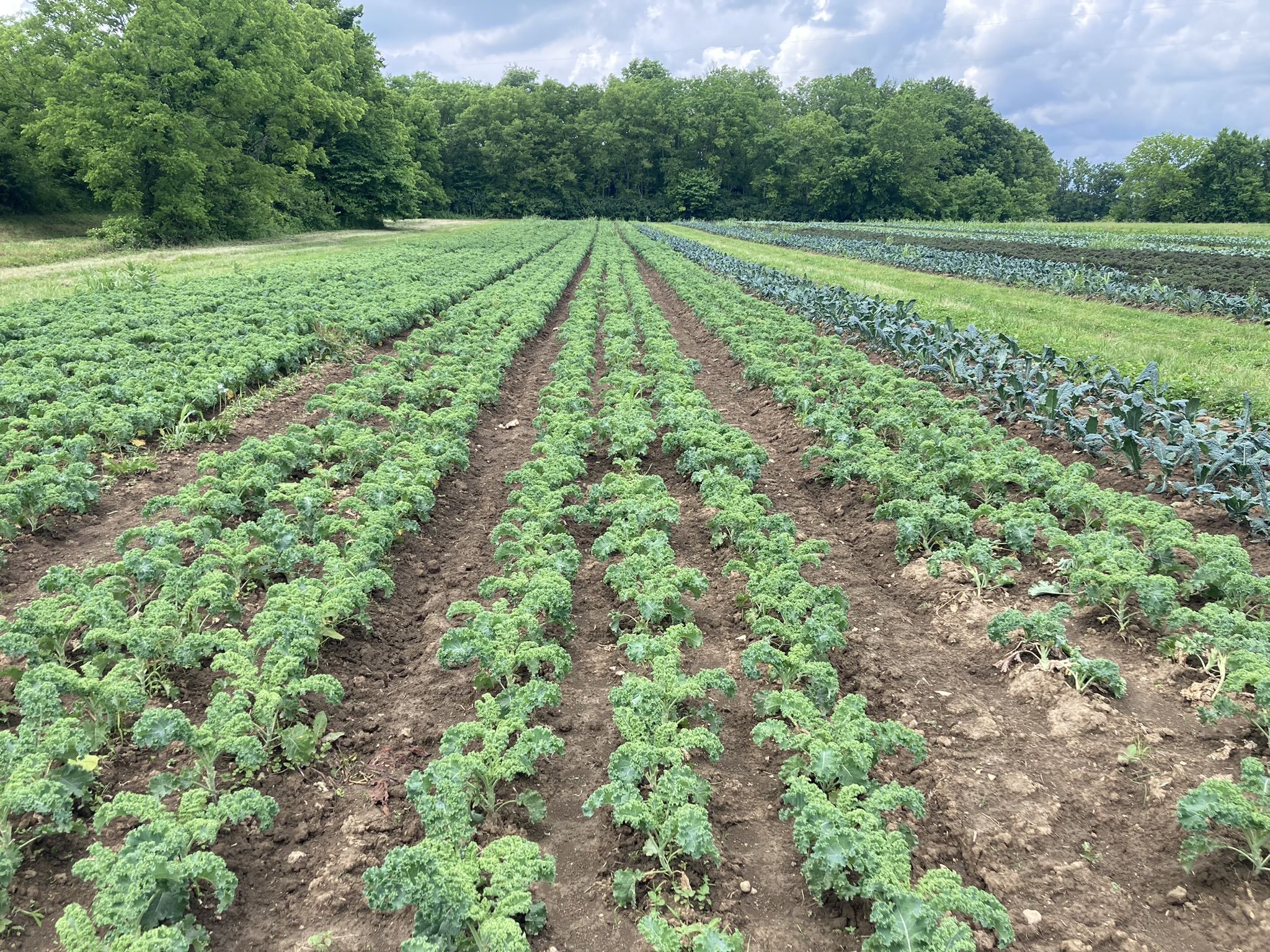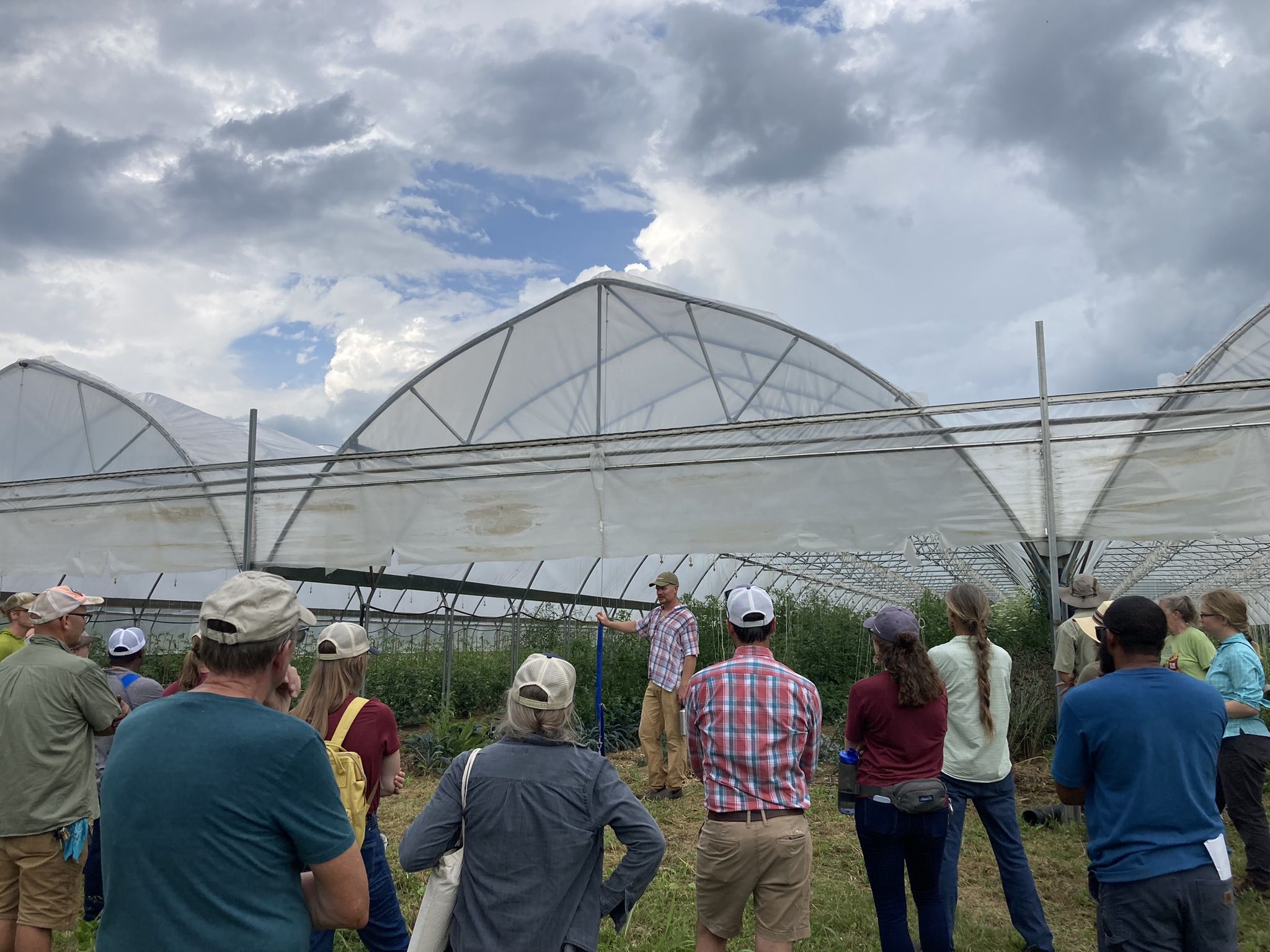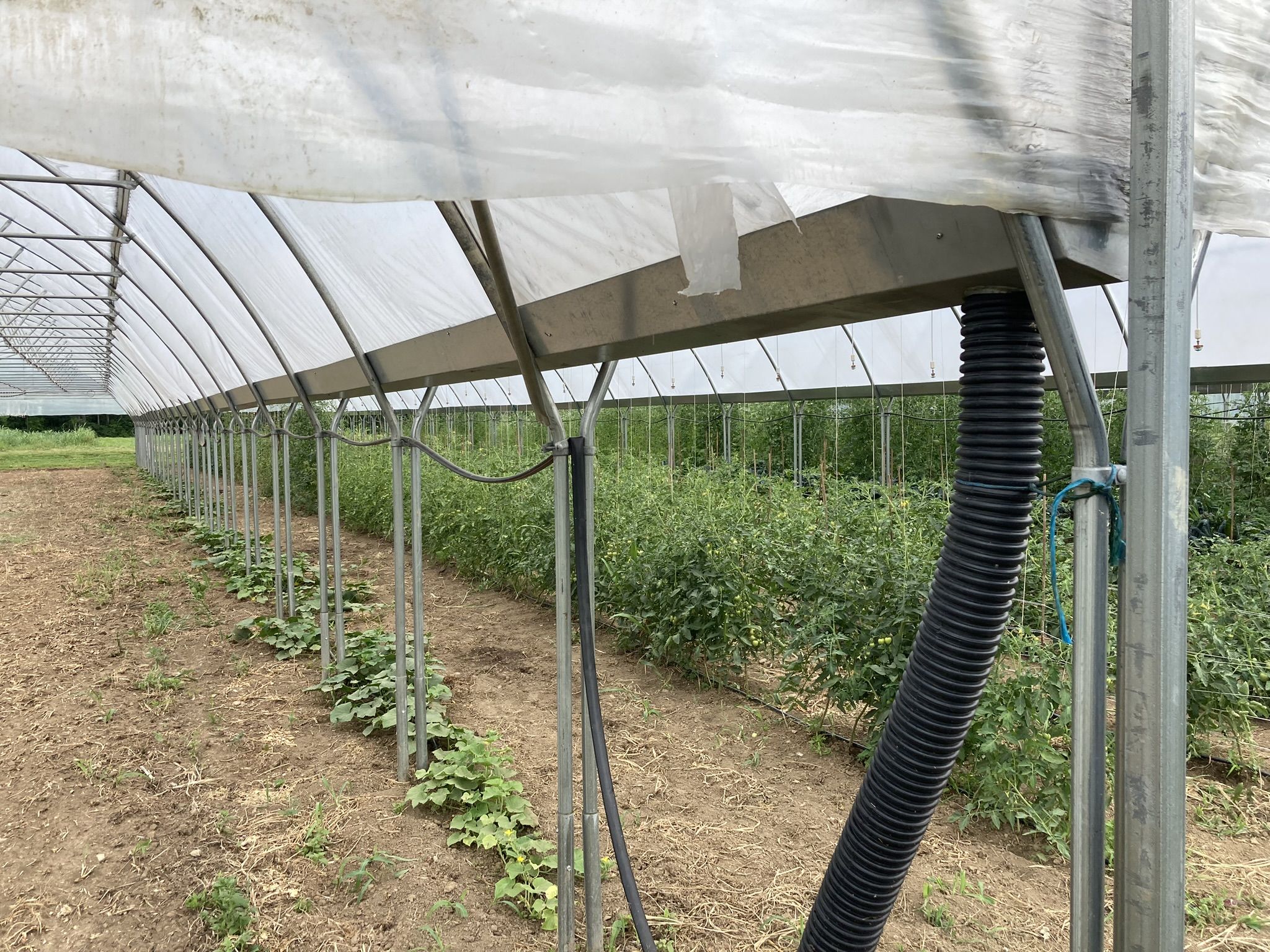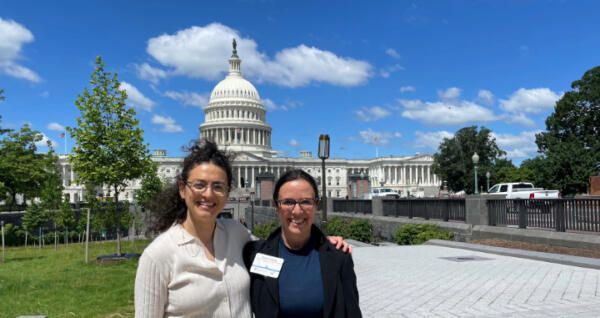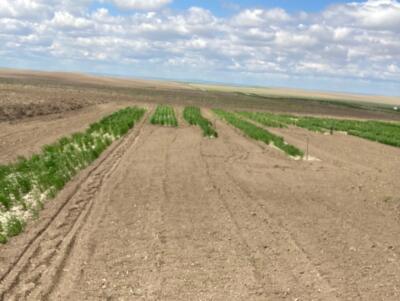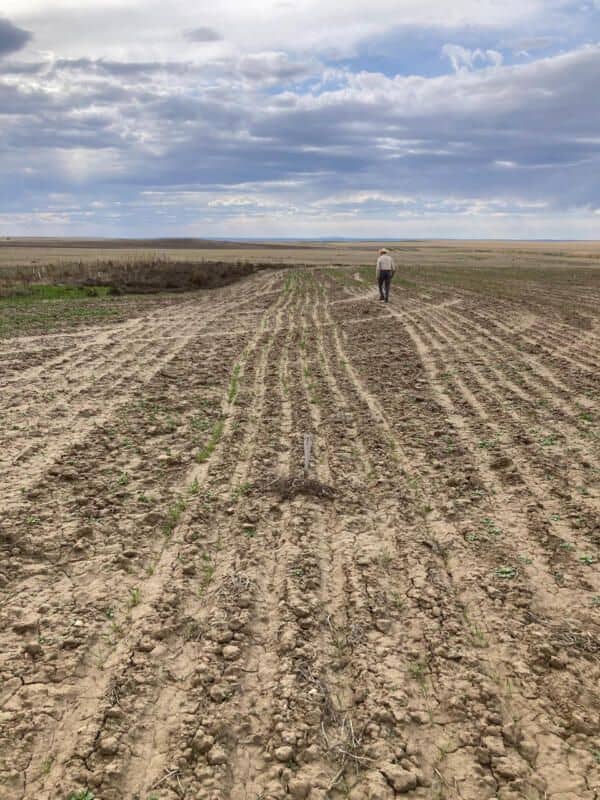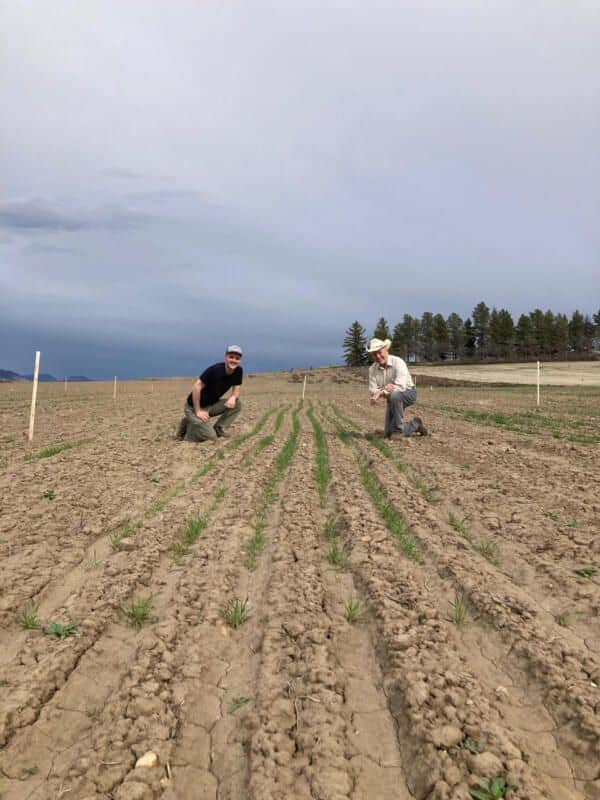The Song of One Thrush: Why We Need Each Other to Build a Healthier Food System
Written by April Jones Thatcher, founder and farmer of April Joy Farm and president of OFRF’s Board of Directors
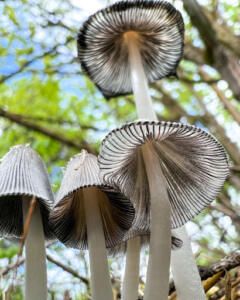
Photo by Lauren Ruhe
I faintly heard a single Russet-backed thrush in the ravine behind the farmhouse this week. Late at dusk and then again this morning. In June, her melodious spiraling melody is one more sign of hope and promise for the growing season before us.
This is my sixteenth year of farming. I have always seen my role as less of a ‘producer’ and more about removing barriers to ensure energy—life—could flow and nourish these 24 acres I’ve loved since I was four years old. Early in my journey, my perseverance was rooted in the belief that things would get easier. Over time, I thought as I developed processes, scraped together increasingly more robust infrastructure, fence post by fence post, seed by seed, experience by experience, “things”—i.e., farming—would get easier.
I believed my work as a farmer would eventually be to get out of the way. But I quickly learned, as Frank Edwin Egler so aptly wrote, “Nature is not more complicated than you think, it is more complicated than you can think.”
I look back now and feel grateful for all that heady naivety that fueled my days and made me dig deep and keep going. So much has transpired between those early days and now, things I could have never imagined…
A multi-day 116-degree (F) heat dome.
Wild weather swings, including a late-May hard frost
Forest fires with smoke so thick I couldn’t see to the end of my crop fields
Oh yeah, and that little thing called a global pandemic.
Reality check: It’s not getting easier.
Recounting the difficult times is an easy recipe for discouragement, but that’s not where I want to dwell. One thing that hasn’t changed in the last sixteen years is my belief that the only way we’ll make things work is together. You don’t have to be a farmer to help. In fact, there is so much you can do to make our food system more resilient and healthier that we farmers can’t do.
I am one of the 17,445 organic farmers in the United States making change happen in and for my community. From an economic standpoint, every dollar spent on local food generates twice as much economic activity within the community compared to dollars spent at national grocery chains. The economic multiplier effect for local food systems has been estimated to be between 1.4 and 2.6, meaning that for every dollar earned by local organic farmers, an additional $0.40 to $1.60 is generated in the local economy. From an environmental perspective, by avoiding synthetic pesticides, organic farming protects the health of farmworkers and nearby communities. Additionally, organic farms are often more resilient to climate change and extreme weather events due to their diverse cropping systems and soil health practices, supporting community food security in the face of climate challenges. Organic farming practices use 45% less energy than conventional farming practices. This translates to significantly reduced greenhouse gas emissions and a more sustainable food system.
How many of those 17,445 organic farmers do you know?
Years ago, there was a thick flock of Russet-backed thrushes that spent their summers at my farm. Now I close my eyes and listen to hear as hard as I can the distance song of just a single one. I feel this loss deeply, but that beautiful song reminds me why I continue to persevere despite the challenges. It’s why I continue to plant pollinator hedgerows, tend my field borders of Nootka Rose, Pacific Ninebark, Red Twig Dogwood, and Mock Orange, and spend each winter planting hundreds of conifer trees in the forest behind the farmhouse each year. Organic farmers like me across the country are re-wilding low swales with native willows that filter water, planting cover crops to feed their soil, and working hard to keep growing nutrient-dense food and meaningful direct relationships with the families that eat it.
The value of organic farms and the farmers who tend them are not rooted solely in the crops that go to market. It’s in the care, the love, and the tending—often without reward in this lifetime—of the hedgerows, the habitat, the soil, and the integrity of the communities they serve and to which they dedicate their lives to enriching.
Organic farmers cross between the world of humans and the world of humus. We are ambassadors working to grow agricultural literacy, understanding, and, at the very heart of things, compassion and care. The value of organic farmers is in the systems they nurture and the ways they pay attention, deep attention, to what matters.
What is your song of determination? Who are you listening for?
What we pay attention to matters.
Your Role in The Food System
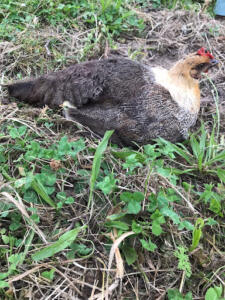 The average American family spends just over 11% of their income on food—a significant portion of our budget. But, just because you do not farm does not mean you are not part of a food system. All of us have a role to play. In fact, all of us are already playing a role in the food system. The question is, do you know what role you are playing? Is it the role you want to play?
The average American family spends just over 11% of their income on food—a significant portion of our budget. But, just because you do not farm does not mean you are not part of a food system. All of us have a role to play. In fact, all of us are already playing a role in the food system. The question is, do you know what role you are playing? Is it the role you want to play?
I’m sometimes asked how I started farming. I was privileged to have a place to farm and a community eager to support me. You can be part of a community to make sure an organic farmer in your area—just like me—survives the daunting challenges of climate change.
Farmers are notorious for saying, ”Well, there’s always next year,” to cope with losses and disappointment. I am not sure I believe this. All we have is now. All we are and all we represent is rooted in this very breath, in action or inaction. There is no hope for next year, next week, or tomorrow unless we care for this day together.
Cultivating A Shared Future
Of all the things that have changed over the last decade and a half of my farming life, one thing hasn’t—the joy of being present to the miracle of food. These weeks, we’re harvesting heirloom lettuces, scallions, Annie’s old-fashioned rhubarb, radishes, epazote, bok choi, sugar snap peas, cilantro, parsley, broccoli, and more. We’re mulching tomatoes, cutting hay, rotationally grazing our livestock, collecting eggs, and thinning table grapes. We’re washing, bunching, and carrying a bounty of good food—grown with love—to families in our community who are as hungry as we are for a healthier, more just food system.
When I hear the song of the thrush, I remember there’s no other choice. I let go of the idea that it will get easier—easier to engage, to make the right choice, to forge relationships across chasms of difference. The farm has taught me that success is in the bravery of honesty, diligent intention, and work. It’s the result of showing up, day after day, to do the small things. I hold fast to the idea that I am not responsible for fixing the problems of our times, but just as surely, it is my responsibility not to turn away.
It takes a community to nurture systemic change. Nurturing our individual relationships one by one is where we start. That’s how this works. Connection is the foundation of resilience.
Sixteen years later, growing food has not gotten easier, but thanks to the deep roots and wide-outstretched arms of my plant, soil, animal, and human community, this work and my farming life are getting richer.
So, with determination to keep showing up regardless of the outcome, let’s take a collective deep breath, exhale all the gratitude we can muster, and get curious about the food stewards working all across the country to nourish our world.
Let’s start paying attention to the most minor details and the tiniest moments embedded in our food system.
Let’s strive to make our connections as rich, beautiful, and full of love as possible.
Let’s lean in and listen hard so we can hear the faint song of others who are doing the same.
There is immense satisfaction in taking direct, intentional action to build a community on a foundation of compassionate connection. That’s why every day, I put on my boots and go out into our world to sow new possibilities and nurture resilience. Regardless of how green your thumb is, you can too.
Won’t you join us?
Ways to Support Your Local Organic Farm System
Ready to take action and support the health of your community, your environment, and yourself? Don’t wait! Here’s how to get started:
- Find your local organic farms. Use online resources like Local Harvest or visit your nearest farmer’s market to connect with organic farmers near you.
- Join a CSA or farm share program. This is a great way to get a regular supply of fresh, organic produce while directly supporting a local farm.
- Volunteer your time. Many organic farms welcome volunteers. This is a rewarding way to learn more about organic agriculture and connect with the farmers who grow your food while using your expertise to support the viability of their work.
- Research organic farmers and/or organic farm advocacy groups in your community. Knowledge is power! Learn more about the organic farming scene in your area and the challenges they face.
- Check out OFRF’s NORA (National Organic Research Agenda) report. Dive deeper! Focus on non-production challenges for farmers in your region. Understanding these issues can help you identify areas where you can be most helpful. What do you feel most compelled and interested in?
- Intentionally choose how you will support organic farming broadly and deeply. There are two sides to it: local action and national advocacy. Consider how you want to contribute on both levels.
- Go broad by donating to organizations positioned to make systemic change on a national scale, such as OFRF.
- Go deep by building just one single relationship with an organic farmer or organic agriculture advocate in your community (like your local and state representatives) and see where that leads.
Remember, every action—big or small—makes a difference. By taking these steps, you’ll be a champion for organic farming in your community!





